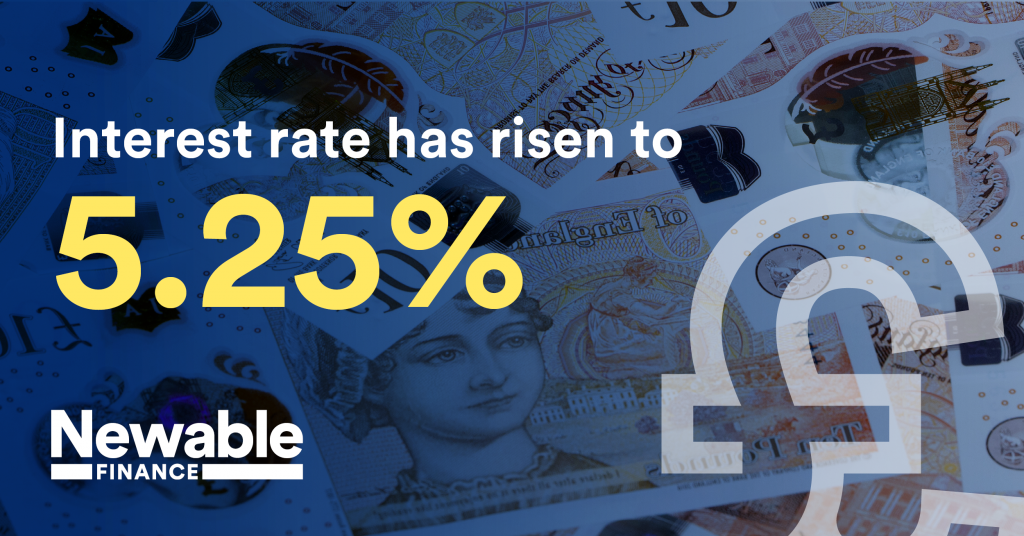This increase is the 14th consecutive rise in interest rates which is only adding to the pressure many businesses and individuals are already experiencing due to the cost-of-living crisis. So, what does the rise in interest rate mean for SMEs?
What are interest rates?
According to the Bank of England, an interest rate states how high the cost of borrowing is, or how high the reward of saving is. For a borrower, the interest rate is how much you owe the lender, on top of the loan being paid back. For a saver, the interest rate tells you what percentage of your savings will be paid into your account.
But why has the interest rate increased?
The Bank of England has explained that the reason behind this increase of the interest rate is inflation. Inflation refers to the rise in the cost of goods. The Office for National Statistics checks the inflation rate each month by comparing the price of various goods and services to the price of them the previous year. The current inflation rate is 7.9% meaning the cost of goods and services have increased by 7.9% since last year.
Inflation can be good for business if it occurs slowly as consumers will spend more on goods and services without paying much attention to it. However, sharp inflation can cause the cost of living to rise with employees needing a rise in salary to cope.
To keep inflation balanced, the Government has set an inflation target of 2%. As the current inflation rate is 7.9%, something had to be done. That is why the interest rate has increased. If the cost of borrowing money increases, then it encourages people to save, meaning the demand of goods and services decreases, causing inflation to fall.
The smallest of changes to the interest rate can have a big impact. So, what does the rise in interest rate mean for SMEs?
1. Increased cost of business loans
According to British Business Bank, 59% of SMEs sought external finance in the past three years and so this increase of the interest rate will affect the majority of SMEs.
There are two types of interest rates when it comes to business loans. The first being a fixed rate. This means that the interest rate does not change over the life of a loan. The recent increase of the interest rate will not affect businesses who have taken out a business loan on a fixed rate. The second type is a tracker rate, a flexible rate which changes as and when the Bank of England decides. For businesses who have taken out a loan on a tracker rate, the recent increase will mean they will need to pay a higher interest rate than before.
The fixed rate may sound like the safer and more cost-effective option, however, when interest rates are low, the tracker rate can end up costing less than a fixed rate loan.
2. Slower growth
With the increase of the interest rate, SMEs may feel less inclined to borrow money to fund expansion. However, with current increase in costs, business owners may need to borrow to fund short-term working capital requirements. Many business owners’ medium and long-term goals may now have changed.
3. Reduced consumer spending
Consumers also have debts and loans they need to pay back and so any change in interest rates will also affect them. With this new increase of the interest rate, consumers will be spending more on paying back their debts and will therefore have less money to spend on goods and services. This cut back on personal spending could lead to a decrease in SMEs sales, fewer successful start-ups, more businesses closing and a decrease of business expansion. According to Digital, 65% of SMEs say it is ‘very likely’ they will permanently close if inflation continues at its current rate.
What can my business do to cope with the increase of interest rates?
Despite interest rates and inflation being out of the control of the public, there are ways in which SMEs can cut-costs to cope with this increase.
- Raise the price of goods and services
- Consolidate your workforce
- Relocate to a cheaper office – find our range of workspaces available
- Refinance existing debt – email us at businesssupport@newable.co.uk
- Get cashflow support
How can Newable help?
Newable is your go-to business support partner. We exist to help other businesses to thrive. We do this by providing the essential resources needed to make the next step in three key areas; Money, Advice and Workspace.
Money
We have a range of financial products and services designed to help your business, including providing long-term investment to help founders through the succession journey as well as help finding finance to cope with the peaks and troughs of trading.
For any cashflow and finance requirements, our highly experienced advisory team will work with you to find the best finance for your needs, providing free and independent advice on your business or your property portfolio.
Our financial solutions:
About Newable
We can also help you in other areas of your business. Whether it be Money, Advice or Workspace, Newable provides the essential resources businesses need to take the next step.
Find out more about how Newable can help you and your business.
Read our other blogs in this series:
Top tips for SMEs on Expanding Globally
5 top tips to help make your business reach net zero
